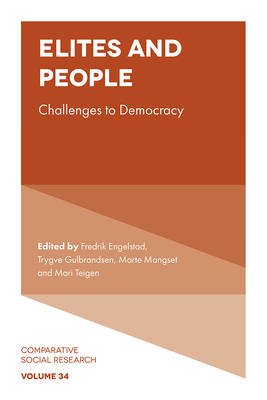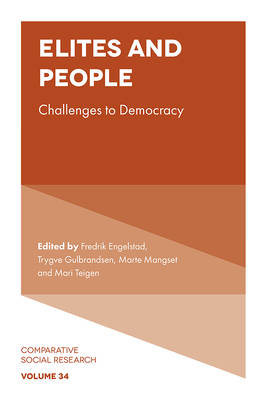
Bedankt voor het vertrouwen het afgelopen jaar! Om jou te bedanken bieden we GRATIS verzending (in België) aan op alles gedurende de hele maand januari.
- Afhalen na 1 uur in een winkel met voorraad
- In januari gratis thuislevering in België
- Ruim aanbod met 7 miljoen producten
Bedankt voor het vertrouwen het afgelopen jaar! Om jou te bedanken bieden we GRATIS verzending (in België) aan op alles gedurende de hele maand januari.
- Afhalen na 1 uur in een winkel met voorraad
- In januari gratis thuislevering in België
- Ruim aanbod met 7 miljoen producten
Zoeken
€ 167,95
+ 335 punten
Omschrijving
This volume contains an Open Access chapter. Relationships between elites and democracy have always been strained. The very concept of elites - of 'chosen people' - stands in contradiction to democratic ideals of political equality. Simultaneously, they are necessary parts of democratic societies. In any large-scale society, democracy is unthinkable without large organizations, be they political bodies, bureaucracies, enterprises, or voluntary organizations. When power is concentrated at the summit of such organizations the incumbents of the top positions potentially constitute groups that often are termed elite groups. The present volume of Comparative Social Research offers a broad set of comparative studies of elites, stretching from the Arab Spring in Tunisia and Egypt to women's political leadership in Brazil and Germany, via attainment of elite positions among minorities in France and the US.
The quality of democratic governance seems to be in decline in many parts of contemporary world. Nevertheless, political elections are still a main source of legitimacy, even when they are far from being free and fair. Developments in the Third Wave democracies established around 1990 both in Europe and in the rest of the world, are treated in several chapters. How do they fare two or three decades later? Another group of chapters sets the focus on elite recruitment and socialization, spelled out against class and gender. The volume concludes by highlighting various entanglements of elites with populism, concerning both underlying reasons for the recent populist expansion and the various images of elites in populist movements.
The quality of democratic governance seems to be in decline in many parts of contemporary world. Nevertheless, political elections are still a main source of legitimacy, even when they are far from being free and fair. Developments in the Third Wave democracies established around 1990 both in Europe and in the rest of the world, are treated in several chapters. How do they fare two or three decades later? Another group of chapters sets the focus on elite recruitment and socialization, spelled out against class and gender. The volume concludes by highlighting various entanglements of elites with populism, concerning both underlying reasons for the recent populist expansion and the various images of elites in populist movements.
Specificaties
Betrokkenen
- Uitgeverij:
Inhoud
- Aantal bladzijden:
- 240
- Taal:
- Engels
- Reeks:
- Reeksnummer:
- nr. 34
Eigenschappen
- Productcode (EAN):
- 9781838679163
- Verschijningsdatum:
- 7/10/2019
- Uitvoering:
- Hardcover
- Formaat:
- Genaaid
- Afmetingen:
- 155 mm x 231 mm
- Gewicht:
- 612 g

Alleen bij Standaard Boekhandel
+ 335 punten op je klantenkaart van Standaard Boekhandel
Beoordelingen
We publiceren alleen reviews die voldoen aan de voorwaarden voor reviews. Bekijk onze voorwaarden voor reviews.








